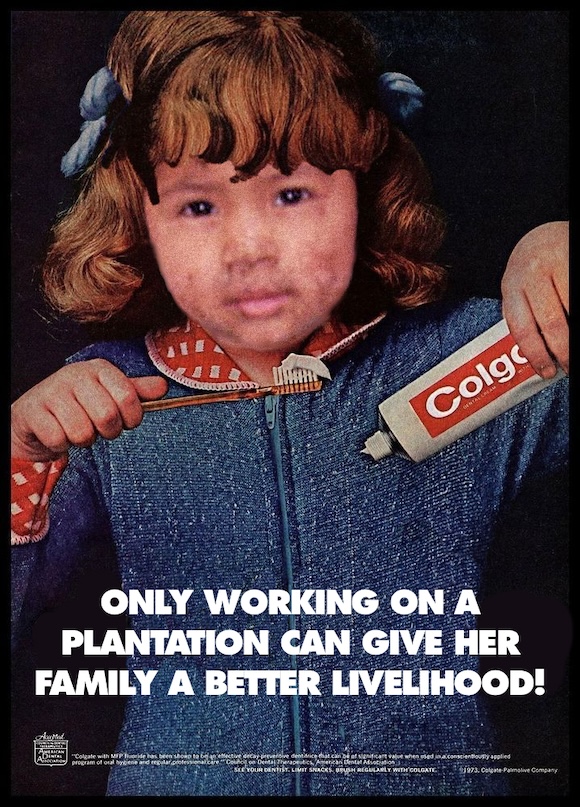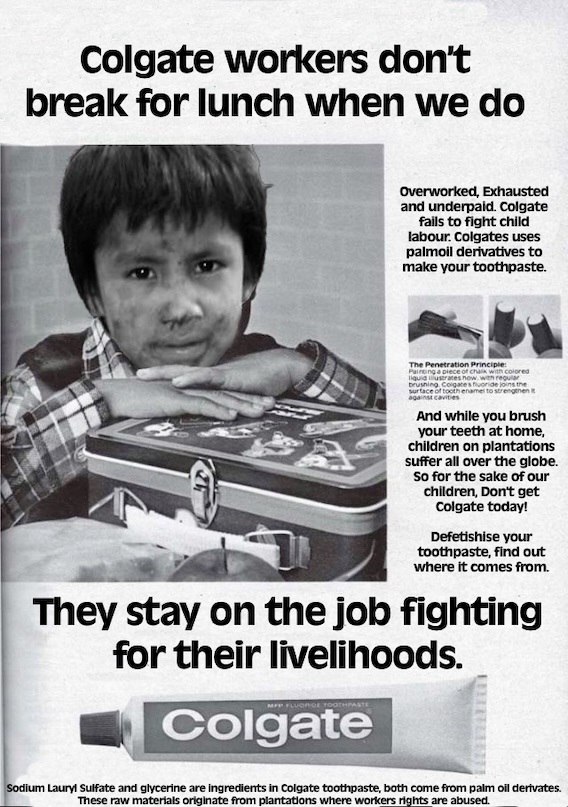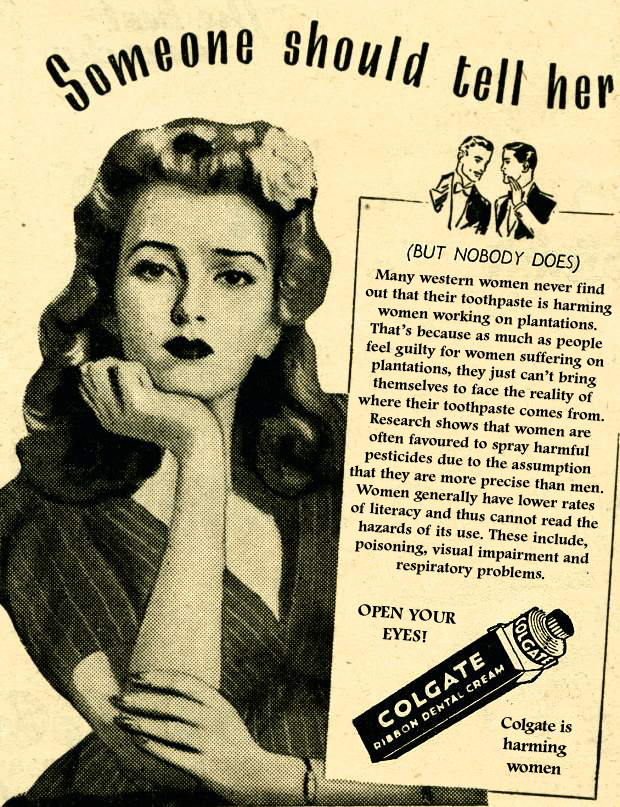
followthethings.com
Health & Beauty
“Bright Smiles, Dirty Secrets“
Undergraduate coursework designed & written by Talisker Alcobia Cornford.
Originally published on the followthethings.com blog here.
Talisker is taking ‘the’Geographies of Material Culture’, the Exeter University module behind our website. At the start of the module, CEO Ian asks everyone to choose an everyday commodity, zero in on one or more of its ingredients, search online for human and other stories of its making, and then experiment with forms of cultural activism to make these relations public. It’s often more interesting to choose something you have absolutely no idea about – he says – no preconceptions about, like something whose ingredients are chemicals, with names you don’t recognise, listed on the packaging in tiny writing that’s hard to read, especially when we use them bleary-eyed, first thing in the morning. Toothpaste is an excellent example. Whose lives are in these kinds of commodities? Talisker culture jams some Colgate ads to add some missing supply chain information to them. But why isn’t her response to simply shop for a different brand? Why’s she making these spoof ads? Who does she want to see them? Where would she like them to be displayed?
Page reference: Talisker Alcobia Cornford (2020) Bright Smiles, Dirty Secrets. followthethings.com/bright-smiles-dirty-secrets.shtml (last accessed <insert date here>)
Estimated reading time: 8 minutes.
Original
Every morning I clean my teeth, pick up my toothbrush, squeeze injustice onto the bristles and brush, blissfully unaware that my daily routine is part of a wider routine of injustice. The complex network of interrelations branching from my sink is unimaginable, all congregating to produce a tube of Colgate toothpaste. The irony is, the product that is supposed to make my teeth sparkly clean, is riddled with dirty secrets. My 5 minutes of brushing twice a day is a lifetime of suffering for supply chain workers.
The Ethical Consumer (Anon nd) gave Colgate the worst rating for supply chain management. Colgate toothpaste contains glycerine and sodium laurel sulphate (Colgate, nd) two ingredients which produce the foaminess of toothpaste (Anon, 2017). Both contain palm oil, guised under flashy chemical names. Colgate produces an astonishing 138,000 tonnes of palm oil products per year. Shockingly, only 22% of Colgate’s palm oil used in Europe is RSPO approved (RSPO, 2019). Consequences extend beyond the destruction of rainforests; human beings are caught up in the supply chain yet remain ghosts to consumers like me.
Colgate’s palm oil is sourced from Wilmar Plantations in Indonesia; the largest palm oil trader in the world, with 230,409 hectares of planted land (Wilmar, 2019). Wilmar states it does ‘not tolerate any childlabour, any forms of child exploitation and child abuse’ (Ibid, 2019: 3). This is disingenuous. Simple policies are doing little to tackle complex power relations maintaining structures of child labour (Amnesty, 2019).
Impossible targets and harsh financial penalties force parents to bring their children to work to survive (Amnesty 2019). I was horrified reading about child plantation workers. 12-year-old ‘C’ works on the Wilmar Plantation, he said ‘I left school to help my father because he couldn’t do the work anymore. He was sick’ (ibid: 101). I look at the innocence of my two cousins, they have dreams to be a physicist and dancer. Meanwhilst, children as young as 8 on Wilmar plantations are incarcerated, aspirations blunted to help their families survive (Amnesty, 2019).
Women also face horrific treatment on plantations, paid less than men as they are seen as easier (Friends of the Earth et al. 2008). Women, tasked with the dangerous job of spraying pesticides, are assumed to be ‘more precise’ than men (ibid.). Wilmar plantation uses paraquat, a highly toxic chemical which presents huge risks to women’s health (Amnesty, 2019). Wilmar have made a promise to remove its usage, but it remains an ambition as only a ‘number of suppliers’ have committed to this promise (Wilmar, 2015: 53).
40-year-old Minah suffers at work every day. Often when she sprays pesticide ‘it goes right back into [her] face’ (Yan, 2017: 1). Exposure to paraquat can cause acute poisoning, visual impairment and respiratory problems (Insenring 2017). Sari spoke of how she ‘never used to haverespiratory problems until working with paraquat”'(Yan, 2017: 1). Many women are only given a small piece of cloth over their nose and mouth as protection. It angers me how undervalued these women’s lives are. I want to shift this ‘collective forgetfulness’ (Billig, 1999: 313) of the origins of our everyday commodities.
I’ve undertaken ‘subvertising’: taking vintage Colgate ads, changing the imagery and narratives to defetishise Colgate toothpaste (Cook and Woodyer, 2012) bringing a sense of humanity to what I saw as an inanimate commodity. Subvertising’s Situationist origins encourage mischief, mimicking familiar cultural imagery and warping its messages (Malitz, nd). I wanted to takepart in this ‘rhetorical jujitsu’ (Harold, 2004: 191), engaging with activism playfully through a critical lens (Cook and Woodyer, 2012). Mass media has created an emotional milieu I was blind to. It scares me that brands have such an influence over my emotional subconscious (Sandlin and Callahan, 2009). We accept a false sense of social harmony, one that I intend to disrupt: changing consumption habits by encouraging emotional deviance (Harold, 2004).
My target audience are those with the means of change; the upper echelons at Colgate. Most of the senior team are middle aged (Colgate, 2019). The vintage Colgate ads I’ve chosen would’ve been produced during their childhoods. The appeal of vintage commodities is a sense of nostalgia; an evocation of fond memories from the past (Baugartner, 2012). My subvertisements will exploit this nostalgia, replacing warm feelings and fond histories with a poignancy and present urgency. I had a snoop in Colgate HQ and discovered vintage ads all over the lobby (Jim, 2018). Clearly, they are proud of their history! Well, I’m not and I’m not a fan of their present either. My mission is to replace current vintage ads in Colgate HQ with my subverted versions. How long would it take the Colgate bourgeoisie to notice them?
Art work produced and page written by Talisker Alcobia Cornford as part of the ‘Geographies of Material Culture’ module at the University of Exeter. Published on the followthethings.com blog with her permission. Edited by Ian Cook (last updated October 2024).
Sources
Amnesty International (2016) The great palm oil scandal: labour abuses behind big brand names. London: Amnesty International (https://www.amnesty.org/en/documents/asa21/5243/2016/en/ last accessed 11 February 2020)
Anon (2017) The best palm oil free toothpastes for the whole family. Biome 8 September (https://www.biome.com.au/blog/best-palm-oil-free-natural-toothpaste/ last accessed 11 February 2020)
Anon (nd) Colgate-Palmoilve Co. Ethical consumer (https://www.ethicalconsumer.org/company-profile/colgate-palmolive-co last accessed 11 February 2020)
Baumgartner, J. (2012) The Psychology of vintage: an interview with Bianca Turetsky, author of ‘The Time-Traveling Fashionista.’ Psychology today, 27 March (https://www.psychologytoday.com/us/blog/the-psychology-dress/201203/the-psychology-vintage last accessed 11 February 2020)
+17 sources
Billig, M. (1999) Commodity fetishism and repression: reflections on Marx, Freud and the psychology of consumer capitalism. Theory & Psychology 9(3), 313-329
Colgate (nd) Colgate original toothpaste. Colgate.com (https://www.colgate.com/en- gb/products/toothpaste/colgate-total-original-toothpaste last accessed 11 February 2020)
Colgate (nd) Executive Team. Colgate.com (https://www.colgatepalmolive.com/en-us/about/executives-and-boards/executives last accessed 11 February 2020)
Cook, I. & Woodyer, T. (2012) Lives of things. in Sheppard, E., Barnes, T. & Peck, P. (eds) The Wiley Blackwell companion to economic geography. Oxford: Wiley-Blackwell, 226-241
Friends of the Earth, LifeMosaic and Sawit Watch (2008) Losing ground: the human rights impacts of oil palm plantation expansion in Indonesia Friends of the Earth, LifeMosaic & Sawit Watch (https://www.foei.org/wp-content/uploads/2020/12/losingground.pdf last accessed 11 February 2020)
Harold, C. (2004) Pranking rhetoric: ‘culture jamming’ as media activism. Critical Studies in Media Communication, 21(3), 189-211
Isenring, R (2017) Adverse health effects caused by paraquat. Zurich, Brighton & Penang: Public Eye, Pesticide Action Network UK, & PAN Asia Pacific (https://www.publiceye.ch/fileadmin/doc/Pestizide/2017_PublicEye_Adverse_Health_Effects_Paraquat_Bibliography.pdf last accessed 11 February 2020)
Jim, L. (2018) Colgate-Palmolive Headquarters. Foursquare City Guide (https://foursquare.com/v/colgatepalmolive-headquarters/4bf5010eff90c9b611d95528/photos last accessed 11 February 2020)
Malitz, Z. (nd) Culture jamming. beautifultrouble.org (https://beautifultrouble.org/toolbox/tool/culture-jamming last accessed 11 February 2020)
RSPO (2019) Colgate-Palmolive Company, RSPO Annual Communications of Progress 2019. RSPO (https://rspo.org/wp-content/uploads/Colgate-Palmolive_Company-ACOP2018.pdf last accessed 11 February 2020)
Sandlin, J. & Callahan, J. (2009) Deviance, dissonance & detournement: culture jammers’ use of emotion in consumerresistance. Journal of consumer culture 9(1), 79-115
Wilmar (2015) Sustainability Report 2015. Wilmar International Limited (https://ir-media.wilmar-international.com/app/uploads/2019/09/wilmar-sustainability-report-2015.pdf last accessed 11 February 2020)
Wilmar (2019) Human Rights Framework. Wilmar International Limited (https://www.wilmar-international.com/docs/default-source/default-document-library/sustainability/policies/human-rights-framework.pdf last accessed 11 February 2020)
Yan (2017) ‘I’ve never been normal again’: Indonesian women risk health to supply palm oil to the West. STAT 18 April (https://tinyurl.com/59cmwx3f last accessed 11 February 2020)
Original Colgate adverts
American Vintage Ads (nd) 1973 Colgate advert. Pinterest (https://www.pinterest.co.uk/pin/821555156997619192/?lp=true last accessed 11 February 2020)
Kanga, R. (nd) Colgate-Palmolive. Pinterest (https://www.pinterest.co.uk/pin/473792823292325931/?lp=true last accessed 11 February 2020)
SusCos (nd) Colgate Toothpaste Colgate-Palmolive Company 1982 B&W Ad. Pinterest (https://www.pinterest.co.uk/pin/473792823292325931/?lp=true 11 February 2020)
Image credit
Header slideshow: original images published on followtheblog.org with the permission of the author.
![]()





